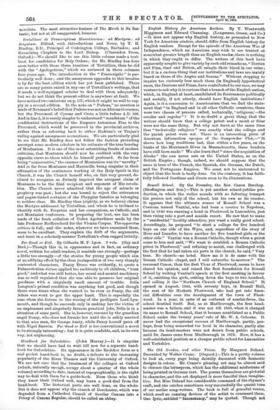Rossall School. By the Founder, the Rev. Canon Beechey. (Skeffington
and Son.)—This is yet another school-jubilee pro. duction, in which the writer sounds with no faltering trumpet the praises not only of the school, but his own as its creator. It appears that the ultimate source of Rossall School was a Corsican named Vantini, who had been a courier to Napoleon, and in 1840 was running a hotel in Fleetwood in Lancashire, just then rising into a port and seaside resort. He saw that to make a "residential" locality attractive, you want a really good school. Accordingly, he proposed "to start a college for five hundred boys on one side of the Wyre, and, regardless of the story of Hero and Leander, to have another for five hundred girls on the other side." Vantini was a Roman Catholic, though when a priest came to him and said, " We want to establish a Roman Catholic priest in Fleetwood," and refusing to assist, was challenged with the fact that he had taken six pews in the church, he said, " Very true. No church—no hotel. Show me it is de same with the Roman Catholic chapel, and I will subscribe to-morrow." The reverend Canon, then the first Vicar of Fleetwood, seems to have shared his opinion, and raised the first foundation for Rossall School by writing Vantini's speech at the first meeting in favour of it, omitting the girls, cutting down the boys to two hundred, and calling it the "Northern Church of England School." It opened in August, 1844, with seventy boys, in Rossall Hall, the seat of Sir Hesketh Fleetwood, Iviho had got into finan- cial difficulties over the development of the town of Fleet- wood. In a year, in spite of an outbreak of scarlet-fever, the school doubled itself. But, as at Marlborough, the first head- master was a failure, and it was not till 1850, when it changed its name to Rossall School, that it became established as a Public School under the twenty years' rule of Mr. W. A. Osborne. It never hid the exceptional success of Marlborough. partly, per- haps, from being somewhat too local in its character, partly also because its head-masters were not drawn from public schools, until Dr. James came from Marlborough in 1875. Now, it has a well-established position as a cheaper public school for Lancashire and Yorkshire.


















































 Previous page
Previous page